Key takeaways:
- Live feedback offers invaluable insights into audience connection, transforming performances into dynamic conversations.
- Engaging with the audience fosters loyalty and nurtures lasting relationships, enhancing both the artistic process and career.
- Specific, constructive feedback improves musicianship, allowing for growth and adaptation in both performance and songwriting.
- Incorporating audience reactions into promotional strategies can significantly enhance visibility and engagement with fans.
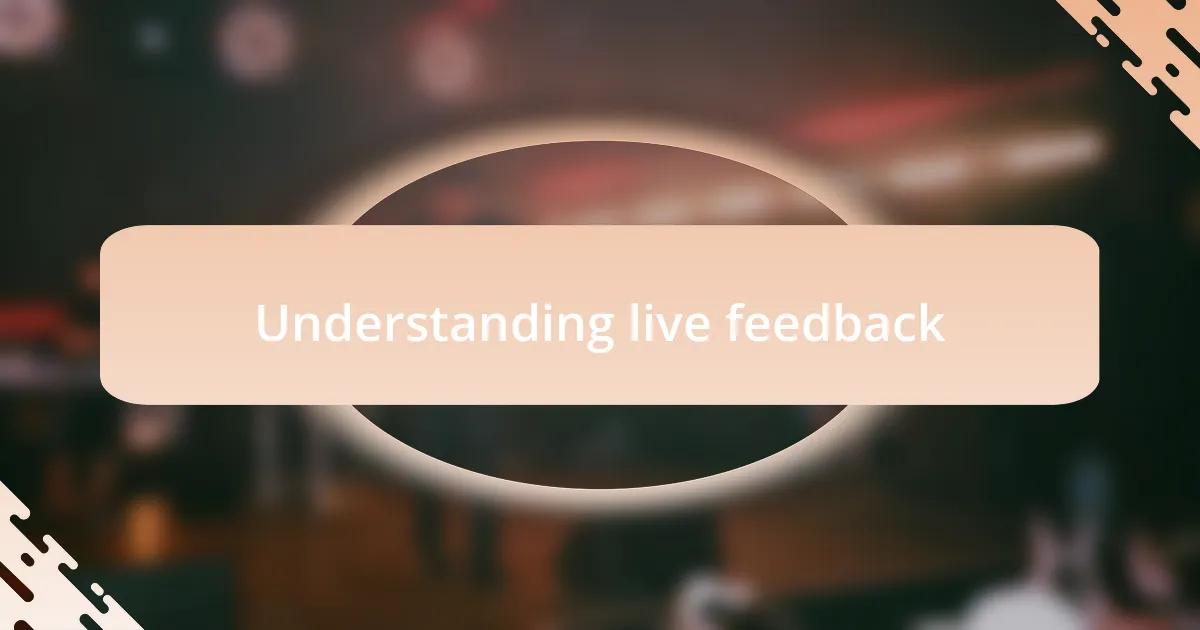
Understanding live feedback
When I first understood live feedback, it was like flipping a switch in my creative process. It’s one thing to hear applause after a performance, yet the real insights often come from the raw, unfiltered reactions of the audience. Can you remember a time when a comment or a cheer made you rethink a song or your stage presence altogether?
In my early days of performing, I would dread those awkward moments of silence after a new song. Over time, I learned to view live feedback as a treasure trove of insights. Each reaction, whether enthusiastic or lacking energy, signaled a deeper connection (or disconnection) with my audience. How fascinating it is that a simple “that was amazing!” or a subdued nod can shape not only my set list but also my artistic direction!
Embracing live feedback transforms the performance experience into a dynamic conversation. I vividly recall a moment when a fan shouted a request mid-set; it sparked a joyful energy that completely changed the atmosphere. It made me realize that understanding live feedback goes beyond mere applause; it’s about tuning into the heartbeat of your audience and letting that guide your next steps. Isn’t it incredible how that instant interaction can refine our artistry?
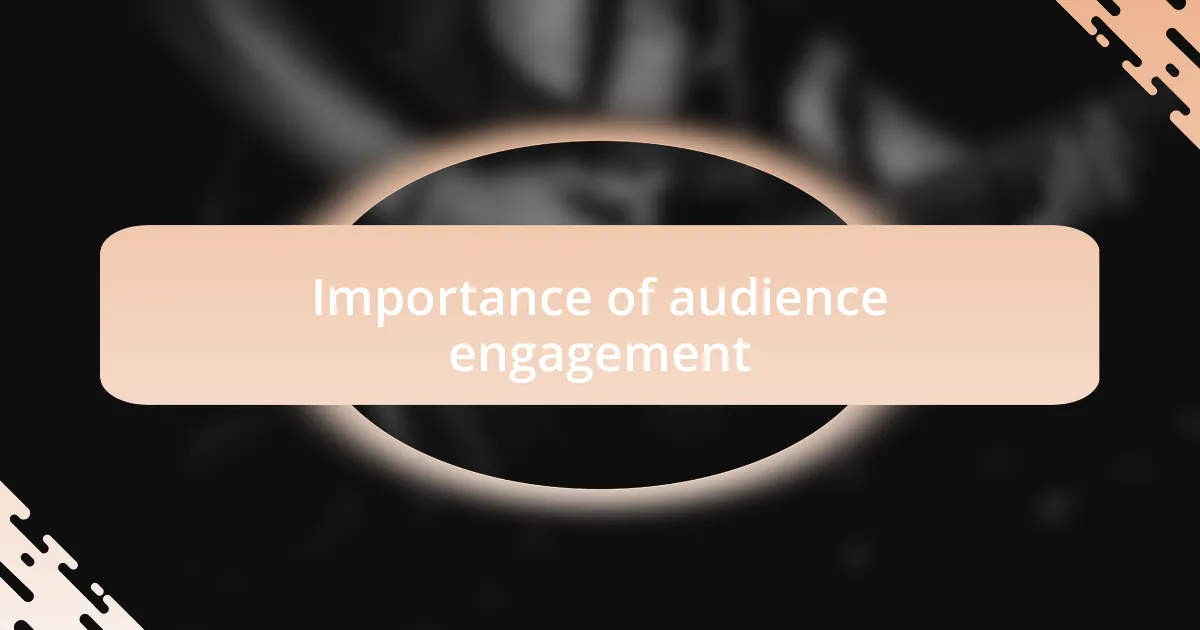
Importance of audience engagement
Engaging with your audience is not just beneficial—it’s essential. I remember a night when an impromptu sing-along broke out during one of my gigs. The crowd transitioned from passive listeners to active participants, creating a shared experience that elevated everyone. That moment underscored how vital audience engagement is; it transforms a typical performance into an unforgettable event, weaving a connection that lingers long after the last note.
In my experience, when an audience feels involved, their energy shifts dramatically. I once played a venue where the crowd was initially reserved, but once I invited them to join in on the chorus, the atmosphere changed. They became more than just spectators; they turned into a choir, united by the music. This interaction not only fueled my performance but also motivated me to write songs that encouraged engagement. Doesn’t that make you think about how powerful a simple invitation can be?
The importance of audience engagement lies in its ability to foster loyalty. I have seen fans who’ve attended shows multiple times, sharing their own stories and perspectives about my music. These interactions built a community around my band. It’s a reminder that when you engage with your audience authentically, you’re not just gaining fans; you’re nurturing lasting relationships. Can you imagine how that deep connection can influence your art and career?
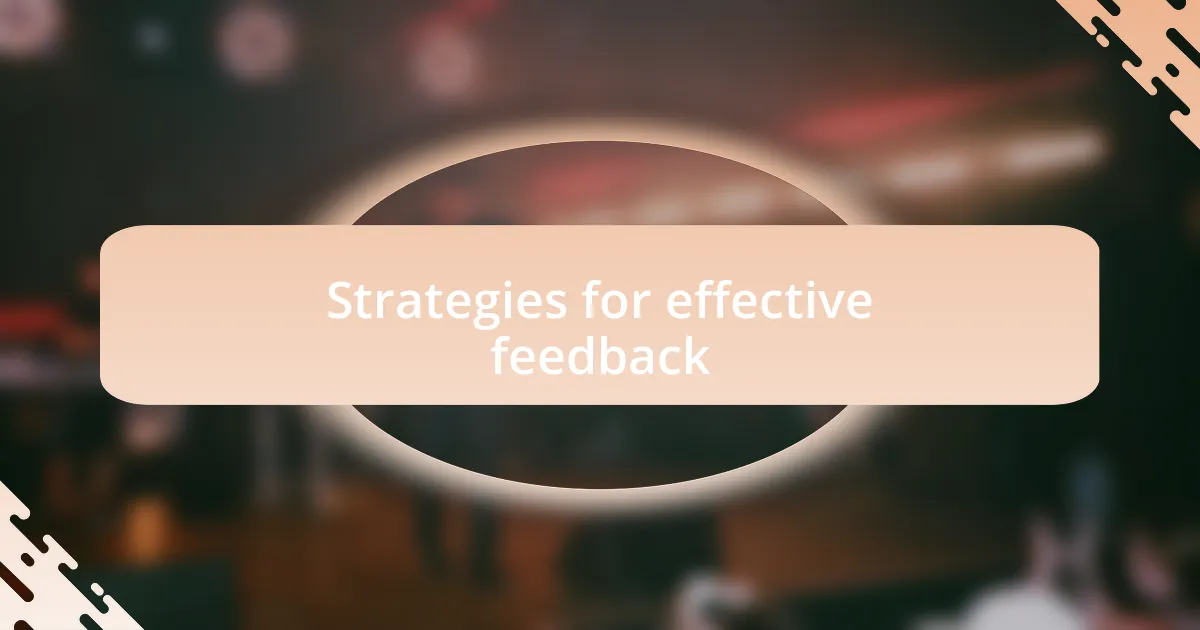
Strategies for effective feedback
When seeking effective feedback, it’s vital to create an open environment where people feel safe to share their thoughts. I remember during a rehearsal, I invited the band members to critique my new song. Their honest feedback was enlightening and revealed aspects I hadn’t considered. Wouldn’t it be great if every musician encouraged such vulnerability within their team?
Another strategy involves being specific when asking for feedback. Instead of general requests like “What did you think?” I’d ask, “How did my vocal delivery resonate with you during the chorus?” This approach invites targeted responses and makes the feedback more actionable. I’ve found that when I’m clear about what I need, the input becomes far more useful.
Lastly, it’s essential to actively listen and reflect on the feedback received. I vividly recall a time when I initially dismissed a suggestion, only to realize later that it could have significantly enhanced my song. Engaging with feedback means not just hearing it, but truly absorbing it. Have you ever regarded a piece of feedback that initially seemed off-base, only to realize its importance later?
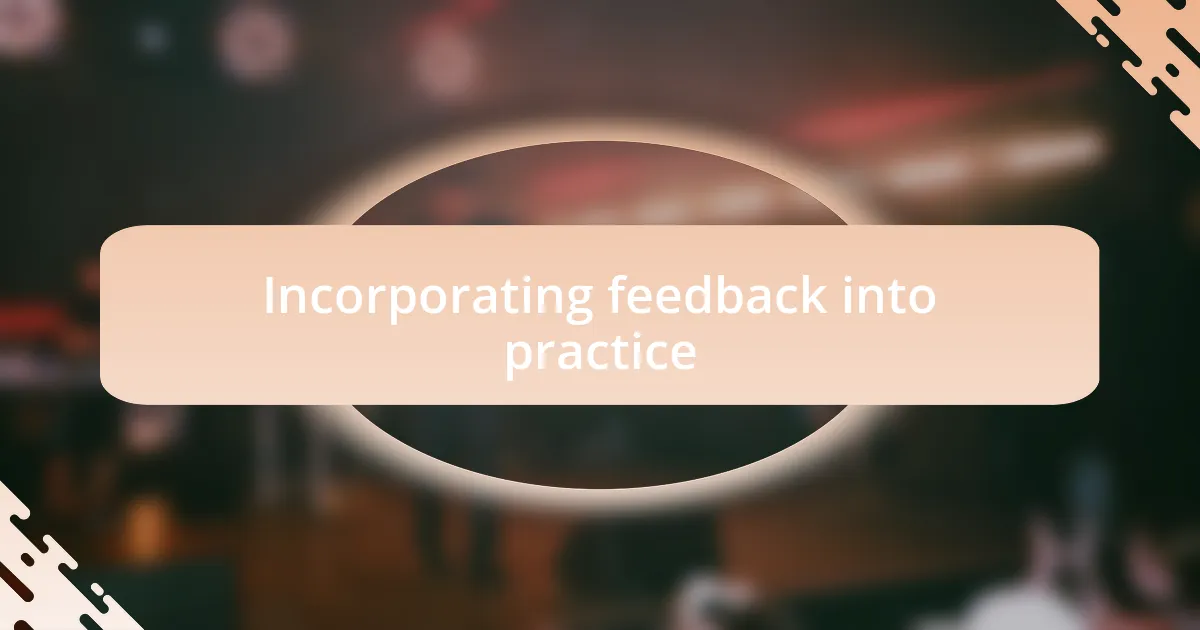
Incorporating feedback into practice
Incorporating feedback into practice is essential for growth as a musician. I recall a time when a fellow band member suggested altering the tempo of a song I felt was perfect. Initially hesitant, I decided to experiment with the change. This small adjustment not only made the song catchier but also revealed a new energy that excited the audience.
I’ve also learned the importance of implementing feedback promptly. During a gig, I received a comment about my stage presence from a fan. That night, I practiced placing finishing touches on my interactions with the crowd. The immediate change led to a more engaged audience, which motivated me to keep refining my performance. Isn’t it fascinating how a single comment can spark a wave of improvement?
Finally, I emphasize the need to revisit and evaluate feedback over time. After performing a new piece, I often jot down the reactions I received from fans and friends. Reflecting on these notes months later provides insights I might have overlooked, shaping my future compositions. Have you ever revisited feedback and discovered new ways to evolve?
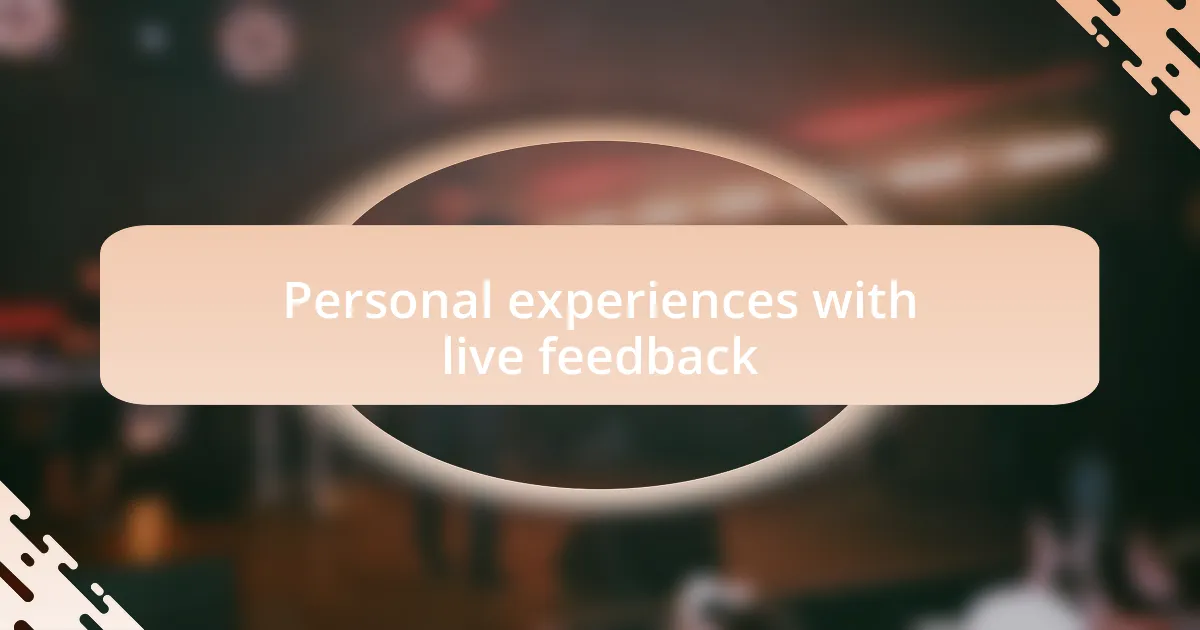
Personal experiences with live feedback
I vividly remember a time during a local festival when a sound technician approached me after our set. He kindly suggested finding a stronger entrance to my solos, believing it would captivate the audience more. At first, I felt defensive—it was my artistic expression, after all. But later that week, as I practiced with his insight in mind, I discovered how much more impactful my solos became, drawing in listeners in a way I hadn’t imagined.
On another occasion, during a post-gig hangout, a complete stranger shared how one of our songs resonated with their personal struggles. The emotion in their eyes struck me deeply, and I realized that feedback isn’t just about performance improvements; it’s about connecting with people. Moments like these remind me that music is a shared experience, making me wonder how I can craft my songs to touch even more souls. Have you ever felt that connection that ignited a new direction for your creativity?
Lastly, I find that live feedback often leads to unexpected revelations. A comment from a fellow musician about my vocal dynamics prompted me to try different approaches in my next rehearsal. What initially seemed like a minor detail resulted in a significant shift in my singing style, allowing me to explore new emotional ranges. Have you experienced a moment where seemingly small feedback altered your creative path dramatically?
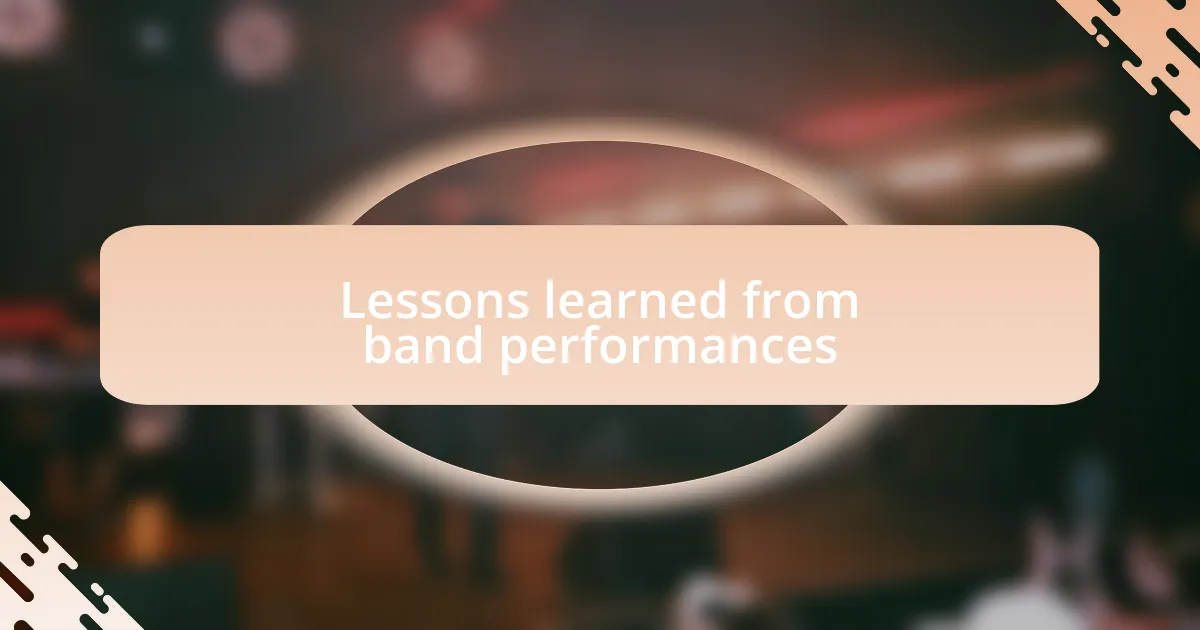
Lessons learned from band performances
During one memorable performance, I realized how essential audience engagement is. I noticed a lull in energy while playing a slow ballad, and the disconnect was palpable. It became clear to me that reading the crowd is crucial—there’s a dance between what we play and how the audience responds. Do you think a band can thrive without sensing the vibe of their listeners?
Another invaluable lesson I learned unfolded when I asked a friend for their honest critique after our set. They pointed out that some songs felt too similar in tempo and mood, which hadn’t crossed my mind. Reflecting on that helped me understand the importance of variety in a setlist. I’ve since made it a point to mix up the musical styles to keep things fresh and exciting. Have you ever noticed how a diverse set can pull the crowd in and keep them engaged?
Feedback during performances often unveils blind spots in my musicianship. There was a night when I forgot a crucial guitar solo, and instead of being embarrassed, I decided to turn it into an unexpected jam session with the audience. Their enthusiasm turned my mistake into a highlight. This taught me that not all feedback is direct; sometimes, it shows us the beauty in spontaneity and the importance of adaptability. Have you ever transformed a mishap into a memorable moment?
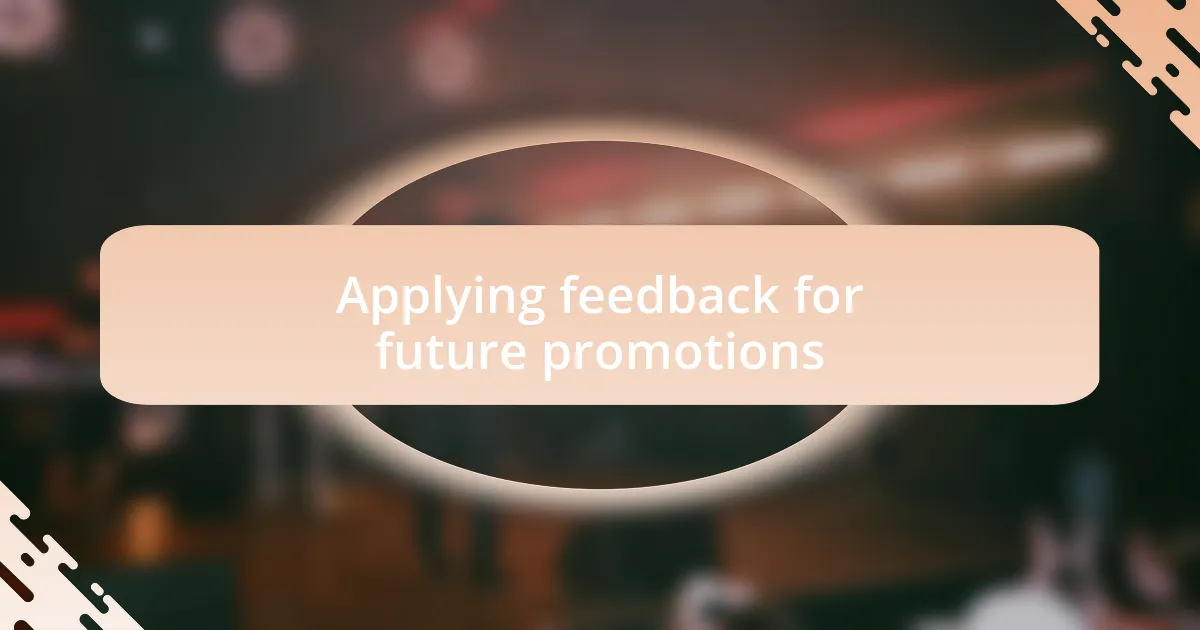
Applying feedback for future promotions
Incorporating live feedback has been a game-changer for shaping future promotions. After one show, a local venue owner shared that people were sharing our performance clips on social media more than our flyers. This insight pushed me to prioritize digital content in future promotions. Have you ever thought about how a simple tweak in strategy can enhance your visibility?
I still remember the post-show conversation with a dedicated fan who mentioned that behind-the-scenes videos brought them closer to our band. This feedback made me realize how much our audience enjoys a more personal connection. To capitalize on this, I started integrating more candid moments into our promotional materials. It’s fascinating how sharing our genuine selves can resonate with fans, don’t you think?
Moreover, tracking audience reactions during different promotions revealed interesting patterns. For instance, when one upbeat performance led to an energetic social media buzz, I found myself eager to feature more high-tempo songs in future sets. This taught me that paying attention to the energy we create on stage directly influences how people engage with our brand. Isn’t it amazing how real-time experiences can guide our future decisions?